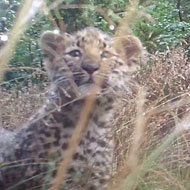
A pair of Amur leopards have been captured on camera for the first time since their birth. The Royal Zoological Society of Scotland announced the birth in July, but with human presence being kept to a minimum, it was not known how many cubs had been born.
Motion sensitive cameras have now revealed that two cubs emerged from the den - at least one of which may be released into the wild in Russia within the next two or three years. The Amur leopard habitat is not open to the public, to help ensure the cubs retain their wild instincts and behaviour.
Image © RZSS



 The latest
The latest